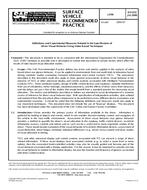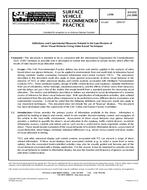Click here to purchase
This SAE Recommended Practice defines key terms and metrics applied in the analysis of video based driver eye glance behavior. It can be applied in environments from real world trials to laboratory based driving simulator studies evaluating Transport Information and Control Systems (TICS). The procedures described in this document could also apply to more general assessments of driver visual behavior in the absence of TICS or other advanced display and control systems associated with Intelligent Transportation Systems (ITS). Driver workload studies, design of traffic control devices and roadways, modality interference from use of cell phones, mirror redesign, situational awareness, and the effects of driver stress from sleep loss and trip delays are just a few of the studies that would benefit from a standard practice for measuring visual allocation. The metrics and definitions described as follows are intended to assist development of a common source of reference for driver visual behavior data. With specification of independent variables, data collated and analyzed from this document allow comparisons to be performed across different device evaluations and experimental scenarios. It should be noted that the following definitions and measures would also apply to eye movement techniques. This document does not include the use of “head-up” displays. This document has been developed under the supervision of the SAE Safety and Human Factors Committee.
Product Details
- Published:
- 07/14/2000
- File Size:
- 1 file , 98 KB

